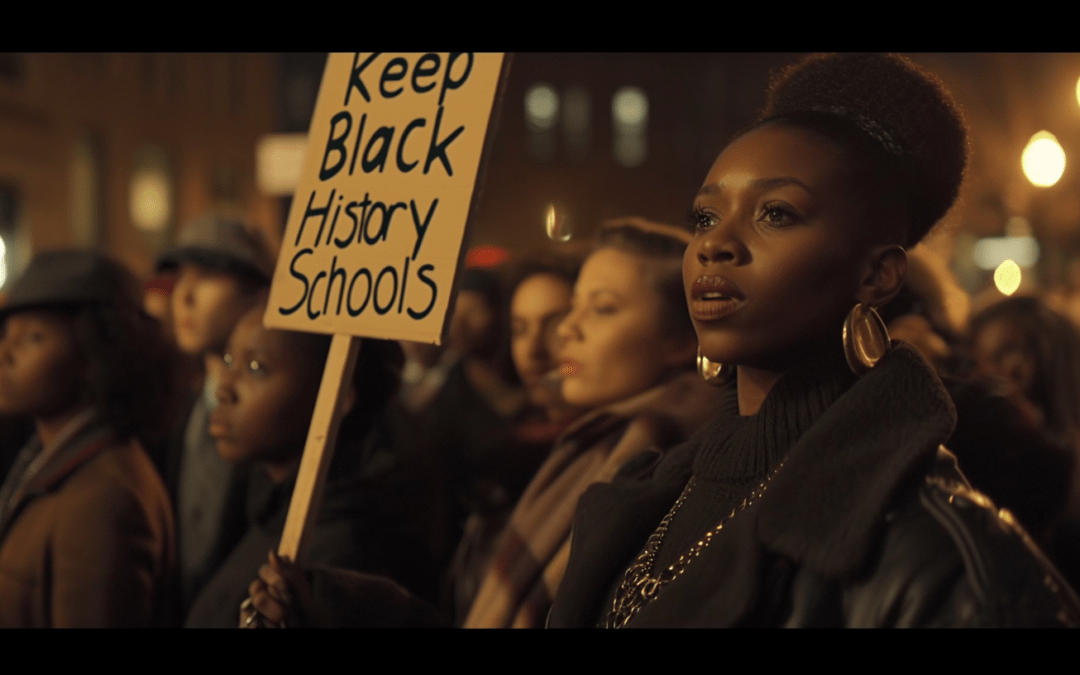Amidst controversy, a Missouri school board reconsiders Black History education, igniting debates on racial sensitivity and curriculum.
By Darius Spearman (africanelements)
About the author: Darius Spearman is a professor of Black Studies at San Diego City College, where he has been pursuing his love of teaching since 2007. He is a passionate advocate for African American history and culture. Spearman’s work highlights the importance of understanding our past to better shape our future. You can visit Darius online at africanelements.org
Introduction: The Spark of Controversy in a Predominantly White District
In Missouri, a decision by a Republican-led school board stirred controversy. The board initially voted to drop elective Black History courses. This decision in a predominantly white district caused an uproar. The Francis Howell School Board reversed their decision, but with strings attached. They insisted on a curriculum that is “rigorous and largely politically neutral” (NewsOne). This move opened a Pandora’s box of debates on education, race, and politics.
Background: The Role of Anti-Racism Resolution Post George Floyd
The board’s actions didn’t come out of the blue. Earlier, they rejected an anti-racism resolution created after George Floyd’s killing. This resolution aimed to combat racism and discrimination in various forms (NewsOne). However, in July, this resolution was revoked. It had pledged that the Francis Howell community would
“speak firmly against any racism, discrimination, and senseless violence against people regardless of race, ethnicity, nationality, immigration status, religion, sexual orientation, gender identity, or ability” (KTLO).
Public Response: Protests and the Demand for Educational Inclusivity

The board’s decision faced significant backlash. Furthermore, protests erupted outside the board meeting. Parents and students united, chanting, “Let them learn!” Inside, speakers expressed their dismay. One speaker, Harry Harris, a Black father, criticized the board for showing “disdain toward the Black and brown communities’ experiences and existence” (AFRO American Newspapers). Additionally, another speaker highlighted broader issues, like high teacher turnover rates.
Key Statistics: Student Enrollment in Black History and Literature Courses
| Academic Year | Black History Course Enrollment | Black Literature Course Enrollment |
|---|---|---|
| 2021-2022 | Over 100 | Not Specified |
| 2023-2024 | 60 | 42 |
Examining the Curriculum: Political Neutrality vs. Social Justice Framework
Critics argue that the demand for a politically neutral curriculum is problematic. Heather Fleming, founder of the Missouri Equity Education Partnership, asserts that Black History can’t be taught neutrally. Our experiences in America are deeply intertwined with socio-political movements (NewsOne). This view challenges the board’s approach to education. It raises questions about the portrayal of history and the role of activism in classrooms.
The Role of Critical Race Theory and School Board Elections
Critical race theory (CRT) adds fuel to the fire in this debate. On one hand, the theory, which examines systemic racism in institutions, is a battleground topic in school board elections. On the other, critics argue that CRT principles aren’t actually taught in K-12 schools. This dichotomy has turned local school board elections into political hotspots, reflecting wider national tensions (NewsOne).
Demographics and Racial Sensitivity in St. Louis
Equally important, understanding the demographic landscape of St. Louis is crucial. The Francis Howell School District is one of Missouri’s largest, with a student population that is 7.7% Black. St. Charles County, where the district is located, has seen dramatic growth. Meanwhile, St. Louis city has faced a population decline. These changes have amplified racial sensitivity in the region, especially in light of historical events like the shooting of Michael Brown in Ferguson (AFRO American Newspapers).
The Francis Howell Families’ Influence and Opposition to Curriculum
Next, let’s consider the influence of the Francis Howell Families PAC. This conservative group strongly opposed the Black history and literature courses. They argued that the courses included principles of critical race theory. This opposition reflects a larger trend of political action groups influencing school board decisions and curriculum content (KTLO).
Timeline: Key Events in the Missouri School Board Controversy
| Date | Event |
|---|---|
| August 2020 | Anti-racism resolution adopted |
| July 2021 | Anti-racism resolution rescinded |
| December 2021 | Decision to drop Black History courses announced |
| 2023 | Protests and backlash lead to reversal of the decision |
Course Descriptions: Celebrating Black Voices and History

Finally, the course descriptions themselves offer insights. The Black Literature course focuses on contemporary works by Black authors. It aims to celebrate the dignity and identity of Black voices. The Black History course connects the past with the present. It traces the journey of Black individuals from ancient African civilizations to today’s achievements. These descriptions highlight the importance of these subjects in understanding the rich tapestry of Black history and culture (AFRO American Newspapers).
Conclusion: The Future of Black History Education in Missouri
Lastly, we must ponder the future of Black History education in Missouri. The Francis Howell School Board’s decisions have sparked critical discussions. These revolve around the representation of Black history, the role of politics in education, and the importance of inclusivity in learning environments. The ongoing debate suggests a larger narrative about how America grapples with its complex racial history and the education of future generations.
FAQ
- Q: Why did the Missouri school board initially decide to drop Black History courses?
A: The board cited a need for a politically neutral curriculum and concerns over teaching methods aligned with social justice activism. - Q: What led to the reversal of the board’s decision?
A: Public backlash, including protests and criticism from community members, pushed the board to reconsider their decision. - Q: How does the controversy relate to critical race theory?
A: Critics argue that the controversy is part of a larger national debate on critical race theory and its alleged presence in K-12 education.
Work Cited
- NewsOne. “Board Reverses Decision To End Black History, Has Stipulations.” https://newsone.com/4893595/missouri-school-board-black-history-classes/.
- KTLO. “Missouri school board that previously rescinded anti-racism resolution drops Black history classes.” https://www.ktlo.com/2023/12/22/missouri-school-board-that-previously-rescinded-anti-racism-resolution-drops-black-history-classes/.
- AFRO American Newspapers. “Missouri school board that previously rescinded anti-racism resolution drops Black history classes.” https://afro.com/missouri-school-board-that-previously-rescinded-anti-racism-resolution-drops-black-history-classes/.

